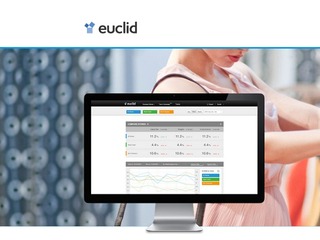
There have been a number of companies that have popped up in the last year or two that are looking to merge the online and offline retail worlds. It’s about time too; after years of hearing that brick and mortar was dead, the more nuanced view has becomes that the two sides are actually extensions of each other.
While most of these companies have focused on the retailer as the primary driver of sales, eyeQ takes a different approach: it goes directly to the brands and gets them on board before it gets the stores involved.
That approach seems to be working, and it has investors interested, as the company announced on Tuesday that it has raised $3.5 million in a Series A funding round led by new investor, Align Capital, with continued participation from existing investor South Coast Angel network, along with an angel that participated in its previous round.
With this funding, eyeQ has now raised a total of $5 million; other previous investors in the company included Corsa Ventures, Houston Angel Network, DreamIt Ventures, Microventures and ETR&D.
Founded in 2012, the Austin-based company uses a variety of sensors which are built so that the eyeQ system targets a specific customer, and figures out what they want to do, based on visual analytics. That means a camera and a PC to approximate age, gender, emotion, attentiveness and traffic count.
It also uses a consumer’s WiFi enabled smartphone to determine frequency of visit, as well as in-store browsing history. It also uses a program based on IBM’s Watson to gain personality insights, which it can also get by taking a user’s Twitter stream. It then uses all that to help drive content. All data is aggregated and anonymous, and is not stored.
Of course, some people may not like the fact that stores are doing this; Michael Garel, founder and CEO of eyeQ, explained to me in an interview that some of it is active, meaning it requires action on the part of the users, while some is passive, meaning the data will be collected without the user opting in. To gain access to a user’s Twitter handle, for example, that is an active component that the user has to agree to.
Most customers, though, don’t have a problem with it. In one store that used eyeQ, when customers were explicitly asked if they would allow the company to use camera to learn more about them, the vast majority, somewhere around 95 percent of people, said they were ok with it.
“The ultimate big problem is how do you enable consumer to continue their digital journey inside a physical store, where brands will be displaying and sharing the message they want to be doing?” said Garel.
“At the same time, they also want to be giving consumers all the information to make purchase in store, and leave them feeling good. Brands understand what shoppers are most interested in, what types of content leads to best response to different types of people, including different demographics, frequency of visit, and even different personality types. We help brands understand what types of content and messaging deliver the best experiences for thge customer depending on those inputs.”
There are other companies that do something similar, including AreaMetics, Euclid and Retailigence, all of whom have the same mission to bridge the offline and online worlds. Instead of seeing those companies as competitors, eyeQ actually sees them as potential collaborators due to the differences between their approaches.
That’s because, unlike for those other companies, where the retailer is the customer, for eyeQ, the customer is the brand. The company’s business model involves getting brands on board, who when connect eyeQ with retailers. The retailers vet the company and the tech, gives approval, and then deploy it in their stores.
“Those other companies do macro level traffic, we do really well with more micro level engagement. They’re doing behind the scenes analytics, we’re delivering to better experiences to the shopper. We’re doing a real world application of analytics, rather than capturing it at the at macro level,” said Garel.
One of eyeQ’s customers is HP, and, by using eyeQ, it was able to “help them ensure that they’re getting best return out of their end cap, while also delivering the right message to the right customer at the right time.” They also allow them to have rapid A/B testing on different types of experiences and content to help them understand what works for which which customer.
The company is currently working with four brands, and it has been deployed in 30 total locations. Those that have used have seen increased engagement at the end cap of 47 percent. One appliance retailer was able to determine that there was a 14 percent increase in revenue directly due to products purchased, and engaged with, on eyeQ screens. In one auto dealership, the average time spent inside went up between 10 and 12 minutes after using the company’s systems to learn more about the vehicles in stock.
The new funding eyeQ has raised will go toward continued technology development, product enhancement.
“One of the challenges, from the tech standpoin,t is that we’re heavily involved. What we’re doing building out, both through integrations to other CTMs, as well as our own, is building out a platform that is more self-serve for brands and agencies so we don’t have to be involved beyond sales and support,” said Garel.
“We’re also looking at other inputs that can help us help our customers have the best experience in methods they want to be engaged. That include other social channels, and we have a a few concepts that we’re building out.”
It will also be used to expand the sales and marketing team, while also growing the accounting team, along with spending more money on trade shows and other events. The company currently has nine employees, and plans to have15 by the end of the year.
In addition to the new funding, it was also revealed that Lisa Harris, managing partner of Align Capital, is being added to eyeQ’s Board of Directors.
“One of the things I like about Lisa is that she’s incredibly strategic. She’s very well connected in the retail space, especially in Dallas, and she thinks very operationally,” said Garel. “What she helps bring to the table is very strategic thinking about how to grow our company. We just recently hired three people, giving us six. How do we grow from six to 15 to 50 people? She’ll help us do that successfully.”



















